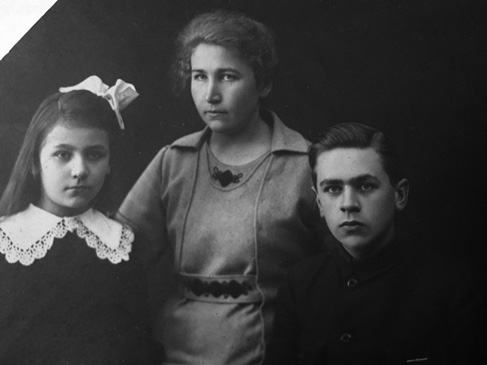This article is taken from PN Review 275, Volume 50 Number 3, January - February 2024.
1939: Before Darkness Fell*
‘No one knew that this was to be the infamous year of the Munich Pact, but everyone knew that soon there would be a new world war…’
Delmore Schwartz, ‘New Year’s Eve’

Erich Haugas and his sisters Benita and Ella
In the summer of 1939 my grandfather Erich Haugas took part in an international agricultural conference in Budapest. He was thirty-eight and his professional pride was flattered. As a chemist he was in charge of the Dairy Export Control Station laboratory in the Estonian capital of Tallinn. To his untravelled eyes this was the trip of a lifetime: Budapest was the last stretch of Western ‘civilization’ before the East and the closest to a West European capital many Estonians would ever get. No direct train went to Hungary: Erich had to take three trains through Latvia, Polish-occupied Lithuania, Poland and the Nazi vassal state of Slovakia: a round trip of 2,300 miles across European frontiers electric with future troubles. The fear of world war was in many minds all over Europe – but to my grandfather the rumours of war were just that: rumours.
His wife Elfriede was anxious. There was no sane reason Erich had to go: a number of delegates had turned down invitations. The calamity of Poland was close at hand but if Erich sensed the gathering emergency, he did not let it show. With a suitcase packed for a two-week absence he ...
Delmore Schwartz, ‘New Year’s Eve’

Erich Haugas and his sisters Benita and Ella
In the summer of 1939 my grandfather Erich Haugas took part in an international agricultural conference in Budapest. He was thirty-eight and his professional pride was flattered. As a chemist he was in charge of the Dairy Export Control Station laboratory in the Estonian capital of Tallinn. To his untravelled eyes this was the trip of a lifetime: Budapest was the last stretch of Western ‘civilization’ before the East and the closest to a West European capital many Estonians would ever get. No direct train went to Hungary: Erich had to take three trains through Latvia, Polish-occupied Lithuania, Poland and the Nazi vassal state of Slovakia: a round trip of 2,300 miles across European frontiers electric with future troubles. The fear of world war was in many minds all over Europe – but to my grandfather the rumours of war were just that: rumours.
His wife Elfriede was anxious. There was no sane reason Erich had to go: a number of delegates had turned down invitations. The calamity of Poland was close at hand but if Erich sensed the gathering emergency, he did not let it show. With a suitcase packed for a two-week absence he ...
The page you have requested is restricted to subscribers only. Please enter your username and password and click on 'Continue':
If you have forgotten your username and password, please enter the email address you used when you joined. Your login details will then be emailed to the address specified.
If you are not a subscriber and would like to enjoy the 292 issues containing over 11,700 poems, articles, reports, interviews and reviews,
why not subscribe to the website today?
